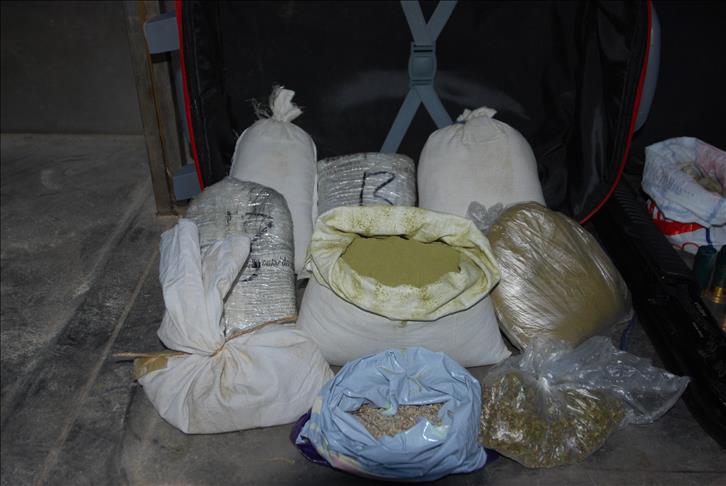
By Burcu Arik
ISTANBUL
The Turkish authorities have declared war on 'bonzai' – a form of synthesized marijuana – classifying it as the most “dangerous drug in the country.”
Prime Minister Ahmet Davutoglu and his government have pledged a stronger effort in the fight against drugs, including a blanket ban on underground intoxicants and chemical substances.
The measures come as part of sweeping changes to the country’s criminal code, unveiled in the aftermath of riots which hit Turkey earlier this month and left more than 30 people dead.
Speaking at a meeting of Turkey's ruling AK Party on Tuesday, Davutoglu said: "Those dealing drugs, including bonzai, will be treated like terrorists and the penalties will double if the crime is committed near schools."
Davutoglu announced 11 elements of a new bill to give more powers to Turkish law enforcement agencies.
Described as a balance between freedom and security, while enhancing the civilian identity of the Turkish state, the new package points to an escalation in the war against trafficking – especially that of bonzai.
Davutoglu’s comments come amid research and media reports claiming that use of the notorious drug is on the rise. A 2014 Turkish Monitoring Centre for Drugs and Drug Addiction report says that 75 percent of the drug’s users were unaware of bonzai’s adverse effects.
Nine-out-of-ten users said that they would never have started taking bonzai if they had known about the drug’s side effects.
"Drug abuse is a tough issue not only in Turkey; the whole world has been trying to deal with this problem," said Deputy Prime Minister Bulent Arinc on Tuesday.
Arinc was addressing a new parliamentary body called the ‘High Council for Fighting Against Drug Use’ which held its first meeting yesterday in Ankara.
According to the council, to decrease drug use, especially that of bonzai, old and ruined buildings across Turkey should be demolished as soon as possible.
"These kinds of buildings are used as an ‘office’ by drug traffickers," said Arinc, adding that 11 narcotics squads will be founded in several cities across Turkey.
He said: "We will increase the number of rehabilitation centers and border gates will be strengthened with more than 2,000 testing devices for detecting the drug."
The latest developments follow steps taken by the Turkish government earlier this year to curb the spread of the lethal drug. In June, the Turkish parliament passed legislation introducing harsher punishments for drug dealers, especially if their victims are minors.
Some reports suggest that there has been a major increase in drug use among teenagers across the country over the past four years, with 20 percent of drug users who underwent rehabilitation being under the age of 18.
However, preventing the flow of the substance into the country is difficult. Turkey’s reputation as a transit country for drug trafficking has seen bonzai arrive mostly from Europe, China and the Turkish Republic of Northern Cyprus, according to Turkey's Association for Combating Drug Addiction and Alcoholism.
The drug’s affordability is suspected of driving its popularity, especially in working-class areas of major cities.
What is bonzai?
Experts say bonzai – which is generally smoked – is 100 times more dangerous than heroin. Users can experience changes in appetite and sleep patterns, difficulty in concentrating, hallucinations, unusual laziness, tremors and shakes.
However, when compared to drug abuse in other European countries, Turkey's overall rate is quite low, according to the 2014 report from the Turkish Monitoring Centre for Drugs and Drug Addiction.
Most bonzai users are males between the ages of 18 and 34, and Istanbul leads in bonzai-related arrests and incidents.
According to the same report, 89 percent of bonzai arrests occurred in Istanbul while 96 percent of the bonzai seizures were made in the Marmara region – a key transit point between Europe and Asia.
The same data also claim 92 percent of people detained in connection with the drug are done so for possession but only 7 percent were arrested for trafficking.
Anadolu Agency website contains only a portion of the news stories offered to subscribers in the AA News Broadcasting System (HAS), and in summarized form. Please contact us for subscription options.

